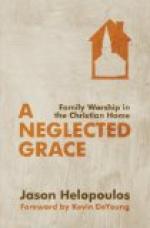If such be the influence of the home-parlor, should it not be held sacred, and made to correspond, in all the uses for which it is set apart, with the spirit and character of a Christian family; and should not its doors be effectually guarded against the intrusion of spurious and demoralizing elements of society?
Parents should teach their children all about the character, interests and deceptions of parlor-life. They should undeceive them in their natural proneness to judge people from the standpoint of character assumed in the parlor. They see the lamb there, but not the lion; the smile but not the frown; the affability of manner, but not the tyranny of spirit. They hear the language of flattery, but not the tongue of slander. They see no weak points, detect no evil temper and bad habits. There is an artificial screen behind which all that is revolting and dangerous is concealed. Who would venture to judge a person by his mechanical movements in the parlor? Many are there the very opposite to what they are elsewhere:—
“Abroad too kind, at home ’tis
steadfast hate,
And one eternal tempest of debate.
What foul eruptions from a look most meek!
What thunders bursting from a dimpled
cheek!
Such dead devotion, such zeal for crimes,
Such licensed ill, such masquerading times,
Such venal faiths, such misapplied applause,
Such flattered guilt, and such inverted
laws!”
One of the most dangerous periods of life is, when we leave the nursery and school, and enter the parlor. With what solicitude, therefore, should Christian parents guard their parlors from social corruption. They should prepare their children for society, not only by teaching them its manners and customs, how to act in company, how to grace a party, and move with refined ease among companions there, but also by teaching




